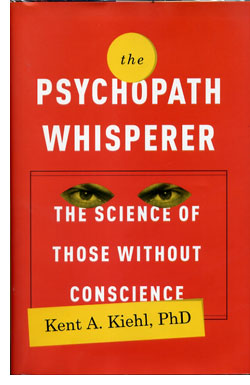 |
 |
 Kent A. Kiehl, PhD
Kent A. Kiehl, PhD
The Psychopath Whisperer: The Science of Those Without Conscience
Crown Publishers / Random House
US Hardcover First Edition
ISBN 978-0-770-43584-4
Publication Date: 04-22-2014
294 Pages; $26.00
Date Reviewed: 05-23-2014
Reviewed by: Rick Kleffel © 2014
Index:
Non-Fiction
Kent Kiehl begins 'The Psychopath Whisperer' with his first day of work as a twenty-three year-old graduate student; he's entering the Matsqui maximum-security prison near the town of Abbotsford, British Colombia to interview the prison's most violent inmates. "Prison is never boring," he tells us. As this utterly compelling books proves, for young neuroscientists studying the brains of psychopathic killers, that is certainly the case.
'The Psychopath Whisperer' is a fascinating book on a variety of levels. The science is groundbreaking, the characters are riveting, Kiehl's story arc as a young scientist making his mark in the field is involving, and the way Kiehl brings together all the threads for a stunning denouement is authentically thrilling.
Interestingly enough, for a fellow who speaks with those whom he describes as having a "flat aspect," Kiehl's prose is itself rather flat of aspect. It seems a bit odd at first, but as he goes on to interact with and describe some of the most vile humans one might hope never to meet, the reasoning behind this choice, if it is indeed one, becomes quite clear. There's a clinical precision at work in the prose for this book that is actually quite appealing. The upshot is that Kiehl's voice is unique and well served by his prose.
Readers will first be struck by Kiehl's keen and crisp sense of characterization. There are a lot of people to get to know in this book, and Kiehl does a great job of bringing them vividly to life, in a variety of fashions. There are three groups; the prisoners, Kiehl's co-workers in the prisons, the academic world and the commercial world, and those in case studies.
Kiehl's portraits of the prisoners are intense and detailed, without ever leering or being judgmental. He does not need to judge, that's been done. But make no mistake, you're not going to read this book and forget about Shock Ritchie, Gordon, or the rest of the crew that Kiehl first interviews when he starts down this path.
Kiehl's path is itself of interest, as is the writer. He's (not so obviously) the main character, and we do get to see him through some twenty years of growth, from a grad student working with and for distinguished scholars like Robert D. Hare and Michael Gazzaniga to his current position as the Executive Science Officer for the Mind Research Network. The men and women who work alongside him gets lots of credit, well-drawn insights into their own careers arcs and become key players in Kiehl's discoveries.
Kiehl also offers some case histories. There's a chapter dedicated to John Wilkes Booth, Lincoln's assassin, and Charles Julius Guiteau, who killed President James A. Garfield. One is quite clearly a psychopath, and the other is not. It's utterly gripping to read, even as it serves to make Kiehl's understanding about what comprises a psychopath crystal clear. Threaded throughout the book are portraits of two men, 'Brian" and "Eric,' tragedies in the making. To his credit, Kiehl elicits real sympathy alongside creepy terror.
The science is utterly fascinating and Kiehl himself played a rather big part in developing much of the MRI technology that we see put to use in brain studies today. He's quick to give credit where credit is due, but Kiehl's efforts to develop tech that would be both portable and offer the sort of temporal resolution he required are gripping to read about and quite accessible to the lay reader.
Readers who regularly read crime fiction and non-fiction and writers of any stripe will find much to like here in terms of the way that Kiehl presents character. Any writer who wants to write about a so-called psychopath and any news commentator who wants to discuss the sort of events that are all-too common would do well to read this book and heed what Kiehl has to say. Kiehl provides a means for looking at any character type here, not just psychopaths.
Kiehl lays down his threads in 'The Psychopath Whisperer' with a plainspoken expertise that ultimately proves to be quite disarming. It might seem as if there are a lot of parallel lines of thought that, while interesting in themselves, offer a whole that is simply the sum of its parts. That would certainly be enough. But the final chapter, "A Serial Killer Unmasked," brings this all masterfully together. Part pop-sci neuro-sci, part story-of-a-scientist, and part true-crime, 'The Psychopath Whisperer is in every way a smart and superior work.
|
 |
|
|
 |
| |
Review Archive
All Reviews alphabetized by author.
General Fiction
Non-Genre, general fiction and literature.
Horror
Supernatural fiction, supernatural horror and non-supernatural horror.
Science Fiction
Science fiction, science fantasy, speculative fiction, alternate history.
Fantasy
Fantasy, surrealism and magic realism.
Mystery
Crime, thrillers, mystery, suspense.
Non-Fiction
Non-Fiction, True Crime, Forteana, Reference.
Poetry
|
|
 |
|




